Budget backpacking is an art that allows you to explore the world while keeping your expenses in check. By adopting a frugal mindset and making strategic choices, you can embark on incredible adventures without breaking the bank. In this comprehensive guide, we’ll share essential tips and tricks to help you master the art of budget backpacking. From planning your trip to managing your expenses on the road, these insights will empower you to travel thrifty and make the most of your backpacking experience.
- Plan and Research: Careful planning is crucial for budget backpacking. Start by setting a realistic budget and determining your destination(s). Research the cost of accommodations, transportation, and daily expenses in each location. Look for budget-friendly destinations and explore low-cost activities and attractions. Having a well-structured plan in place will help you make informed decisions and avoid unnecessary expenses.
- Pack Light: When it comes to backpacking on a budget, packing light is essential. A smaller, lighter backpack allows you to avoid baggage fees, navigate public transportation more easily, and have more freedom to explore. Stick to the essentials, pack versatile clothing items, and opt for multi-purpose gear. Remember, you can always buy items on the road if needed.
- Choose Budget Accommodations: Consider staying in budget accommodations such as hostels, guesthouses, or camping sites. These options are not only cost-effective but also provide opportunities to connect with fellow travelers. Look for shared dorms or private rooms with shared facilities to save even more. Additionally, consider using accommodation booking platforms or apps to find the best deals and discounts.
- Cook Your Own Meals: Eating out for every meal can quickly drain your travel budget. Instead, visit local markets or grocery stores and prepare your meals. Backpacking stoves or communal kitchens in hostels are ideal for cooking simple and affordable meals. Embrace local ingredients and flavors, and you’ll not only save money but also have a more authentic culinary experience.
- Embrace Public Transportation: Utilize public transportation options, such as buses, trains, and local trams, to get around. Public transportation is usually cheaper than taxis or private transfers and allows you to experience the destination like a local. Research transportation passes or cards that offer discounted fares for multiple journeys. Walking or cycling within cities or smaller towns is also a great way to save money and explore at your own pace.
- Prioritize Free and Low-Cost Activities: There are plenty of free or low-cost activities in every destination. Explore parks, visit public museums on free-entry days, join walking tours, or hike in scenic areas. Research local festivals, markets, and cultural events that provide immersive experiences without hefty price tags. Take advantage of the natural beauty and cultural heritage of each place without spending a fortune.
- Embrace the Sharing Economy: The sharing economy has revolutionized budget travel. Utilize platforms like Couchsurfing to find free accommodations, or consider house-sitting opportunities that allow you to stay in a local’s home for free in exchange for pet-sitting or house maintenance. Ridesharing services can also help reduce transportation costs, and peer-to-peer rental platforms can provide affordable gear or equipment for outdoor activities.
- Travel Slowly: Instead of rushing from one destination to another, embrace slow travel. Spending more time in fewer places allows you to explore in-depth, discover hidden gems, and negotiate better prices for long-term stays. Additionally, slow travel reduces transportation costs and minimizes the stress of constantly moving from one place to another.
- Stay Flexible: Flexibility is key when backpacking on a budget. Remain open to changing your plans based on affordable opportunities or last-minute deals. Off-peak travel, shoulder seasons, or even weekdays often offer better prices for accommodations, flights, and attractions. Being flexible with your travel dates and destinations can save you significant money.
- Connect with Locals: One of the most rewarding aspects of budget backpacking is connecting with locals. Engage in conversations, seek their recommendations, and embrace local customs. Locals often know the best-kept secrets, affordable dining spots, and free activities in their area. Building connections can not only enrich your travel experience but also open doors to unique and budget-friendly opportunities.
Conclusion
Mastering the art of budget backpacking allows you to explore the world while being mindful of your finances. By planning ahead, packing light, choosing budget accommodations, and embracing local experiences, you can stretch your travel budget and make the most of your journey. Remember, it’s not just about saving money; it’s about immersing yourself in new cultures, building connections, and creating lifelong memories. So, put these essential tips into practice, hit the road, and embark on an adventure of a lifetime without breaking the bank. Happy backpacking!









